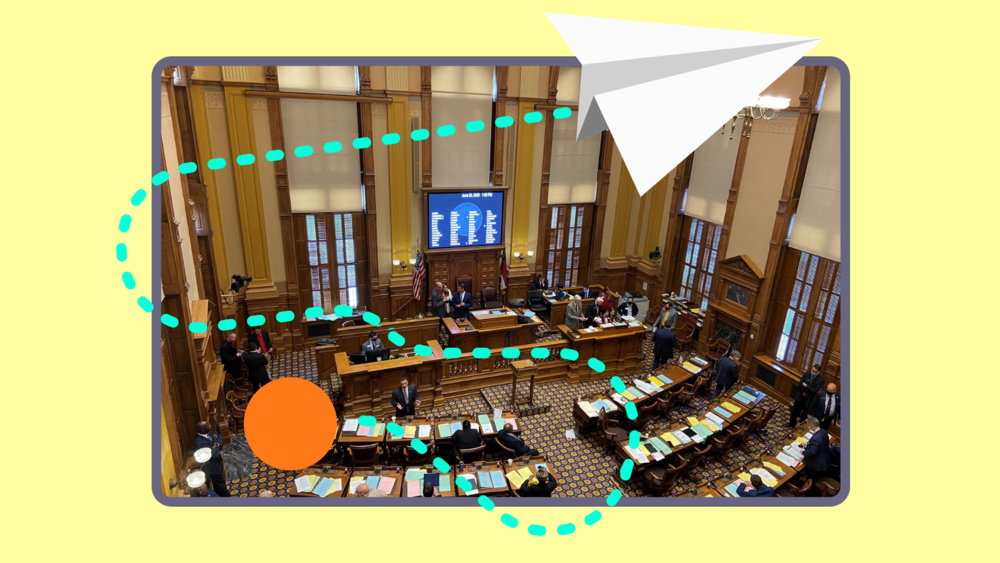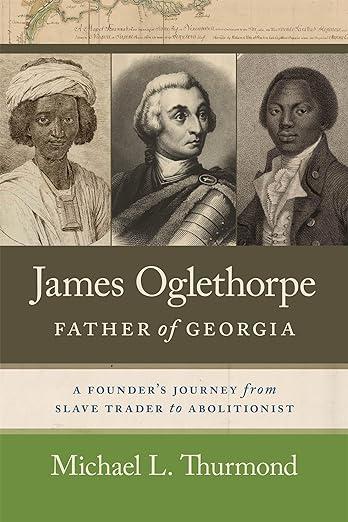
Section Branding
Header Content
Georgia Today: Crossover Day; Naxolone in public schools; James Oglethorpe book
Primary Content
On the Thursday February 29th edition of Georgia Today: Today is Crossover Day at the State Capitol we'll look at what that means for pending legislation before lawmakers; A bill to allow an opioid reversing drug in schools is moving forward after passage in the Senate; And a new book promises to shake up our understanding of the founder of Georgia. We'll talk to the author.

Orlando Montoya: Hello and welcome to the Georgia Today podcast from GPB News. Today is Thursday, Feb. 29. I'm Orlando Montoya. On today's episode, today is Crossover Day at the state Capitol. We'll look at what that means for pending legislation before lawmakers. A bill to allow an opioid reversing drug in schools is moving forward after passage in the Senate. And a new book promises to shake up our understanding of the founder of Georgia. We'll talk to the author. These stories and more are coming up on this edition of Georgia Today.

Story 1:
Orlando Montoya: Georgia lawmakers face a key deadline to pass bills today. Several closely watched measures, including legislation on immigration and religious liberty, are still in doubt. GPB's Donna Lowry explains it's Crossover Day at the General Assembly when bills have to pass either the House or the Senate in order to cross over to the other chamber for more debate.
Donna Lowry: It's the end of a biennium session when bills have a two-year shelf life, essentially. Any bills that don't make it would have to be reintroduced next session. So of course, there's some legislation that can make it in. It can be tagged on to something else. But for the most part, if it doesn't pass in either the Senate or the House, then it doesn't have a chance of being a bill. And I should say the legislative day doesn't necessarily end at midnight. It can end when the legislature decides.
Orlando Montoya: Tune in to GPB-TV or GPB.org tonight at 7 p.m. for a special one-hour Crossover Day episode of GPB's Lawmakers.
Story 2:
Orlando Montoya: One bill that did make it through on Crossover Day as of this recording, is a measure in the Senate allowing opioid overdose reversal medication in schools. GPB's Ellen Eldridge reports the bill passed unanimously and now heads to the state Senate.
Ellen Eldridge: Senate Bill 395 allows teachers, administrators, visitors and anyone in public school buildings to carry naloxone. Currently, only a school nurse can stock or administer the medication. It's designed to stop an opioid overdose. Bill sponsor Sen. Clint Dixon, who lost a family member to an overdose, says even bystanders can feel comfortable aiding in a suspected overdose situation, like at a school.
Clint Dixon: There's no known side effects to the drug. Also, if it's administered and you're not having an overdose from fentanyl, there's no known side effects from it.
Ellen Eldridge: Dixon says grants are available to help schools pay for naloxone nasal spray. For GPB News, I'm Ellen Eldridge.

Story 3:
Orlando Montoya: Georgia Democrats are hoping to pass legislation protecting in-vitro fertilization or IVF after an Alabama Supreme Court decision that threatens the legality of the infertility treatment. GPB's Sarah Kallis has the latest.
Sarah Kallis: Sen. Elena Parent filed two bills in the Senate. One aims to protect IVF by specifying that an embryo outside the uterus is not legally considered a child. The other seeks to codify the right to contraception.
Elena Parent: Georgians have the right to health care, to reproductive health care, and to contraception and family planning tools, and any restriction on this access is dangerous because it prevents people from making choices that affect their physical, mental, economic, health and well-being.
Sarah Kallis: The bills are unlikely to pass this session. Georgia's current abortion law outlawing abortion at about six weeks into pregnancy, does not create a definition of personhood that would jeopardize the legality of IVF or contraception. For GPB News, I'm Sarah Kallis at the state capitol.
Story 4:
Orlando Montoya: Gov. Brian Kemp has signed a record nearly $38 billion fiscal 2024 midyear budget. The spending plan signed today includes $5 billion in new spending and draws on an unprecedented $16 billion budget surplus. For the first time in memory, it pays for major capital projects using cash instead of bond financing. With the midyear budget now behind lawmakers, they'll next tackle Kemp's $36 billion fiscal 2025 budget.
Story 5:
Orlando Montoya: The director of the Georgia Economic Forecasting Center says the state will experience an economic slowdown but no recession this year. Director Rajeev Dhawan of Georgia State University presented the center's semiannual economic forecast yesterday. In it, he predicted Georgia will add 37,000 jobs in 2024, less than half the number of jobs added last year.
Rajeev Darwhan: The economy is weaker than we think it is because I look at the lead predictor of growth down the road: business investment.
Orlando Montoya: He says he expects Fed rate cuts to spur investment going into 2025. The Georgia forecast is largely consistent with national trends.
Story 6:
Orlando Montoya: Today is Feb. 29, a day that comes around only once every four years. And since Leap Year Day 2024 falls on a Thursday, that means an extra day of work. That's good news for hourly workers, but for those on an annual salary that could feel like working an extra day without pay. Candace Jackson is a partner in the Atlanta-based accounting firm Moore Colson. She says business owners should account for leap year when analyzing revenue.
Candace Jackson: Companies need to be careful when looking at comparative February financial statements year over year. Because this February may look better than last February. But again, you know, it may just be that small, incremental additional day of production.
Orlando Montoya: Leap year day accounts for just one of 91 days in the first quarter of 2024, meaning that its impact ,in theory, is about 1%. The Wall Street Journal reports that few companies even mention it in their financial disclosures.

Story 7:
Orlando Montoya: General James Oglethorpe is a name Georgians should know. He founded the British colony of Georgia in 1733, and there's no shortage of books written about him. But a new book promises to shake up our understanding of the man. It's written by another Georgia history maker. Former Georgia labor commissioner and current CEO of DeKalb County, Michael Thurmond. He joins me now to talk about his book: James Oglethorpe, Father of Georgia: A Founder's Journey from Slave Trader to Abolitionist. Thanks for joining me today.
Michael Thurmond: Thank you so much for the invitation, Orlando. I am honored to be here.
Orlando Montoya: You write that this book has been a long time coming for you, and that its central ideas go back to your interest in the Georgia founder. This started with a trip you took back in 1996 to his burial site in England. What did you see at Oglethorpe's final resting place that started this 20-plus-year journey of discovery for you?
Michael Thurmond: General Oglethorpe and his wife Elizabeth, are entombed beneath the floor of the parish church of All Saints, in the village of Cranham, about 19 miles northeast of London. And there is a large white marble plaque. And it simply stated, "He was the friend of the oppressed Negro."
Orlando Montoya: Many people know that Oglethorpe banned slavery in Georgia. That's a critical part of this story, isn't it?
Michael Thurmond: Absolutely. He was one of 21 original Georgia trustees, and they prohibited the importation of enslaved Africans and enslaved Black people into the colony of Georgia, because they felt that it would have an extremely negative impact and undermine their ability to help poor, impoverished, unemployed Europeans find economic security in the New World. The prevailing narrative is that slavery was prohibited to protect the safety and the morals of white colonists, with very little concern, if any, for enslaved Blacks.
Orlando Montoya: And your book sort of challenges that notion and seeks to revise that to put more emphasis on his abolition. Why do you think those explanations and revisions are needed?
Michael Thurmond: I think it's important to complete his legacy and to help future generations of Georgians fully appreciate and understand his humanistic views, his legacy and his lifelong opposition to slavery. At first, he was an anti-slavery advocate, but later in life became an abolitionist.
Orlando Montoya: At first he was not only just I mean, how do I put this? He was sort of indifferent, would you — would you say? In, in his early career, he was sort of indifferent to the matter of slavery?
Michael Thurmond: That's an excellent way to describe it. Oglethorpe briefly served as the deputy governor of the Royal African Company, established for the express purpose of exploiting the West African slave trade — captured and then transported, well, some almost 300,000 Africans to the Americas. So this was a principal slave trading firm. He briefly served as a deputy governor. The first formerly enslaved Black man that came into Oglethorpe life was Yabu Sulayman Diallo, who was a young African Muslim captured, enslaved, transported to the Maryland colony. Diallo was educated. Came from a wealthy family in what is now modern day Senegal. After a failed escape attempt from a tobacco plantation, Diallo's enslaver allowed him to write a letter. The letter is written in Arabic. In the most improbable set of circumstances — Number one, the enslaver allowed him to write the letter, but number two, it traveled 4,000 miles, passed through the hands of several white enslavers who worked for the Royal African Company, and ultimately fell in the possession of James Oglethorpe. Oglethorpe sent the letter to Oxford University, had it interpreted. He was so affected by the contents of the letter that he arranged for Diallo's freedom, passage from Maryland to England, where he was ultimately manumitted and set free. After Oglethorpe read the letter that talked about, number one, his piety towards the religion of Islam, love for his family, and the fact that he was literate, is what triggered Oglethorpe s journey from slave trader to abolitionist. Shortly after reading the letter, he resigned from the Royal African Company, severed all ties, and began this amazing lifelong journey the awareness to an anti-slavery position.
Orlando Montoya: His views were radicalized, you could say, or his views became more zealous when he came back to England. Can you talk about his later in life anti-slavery zeal?
Michael Thurmond: Well, he never forgave those pro-slavery colonists that basically, wanted to bring slaves into Georgia and did everything they could. Oglethorpe was the only trustee to actually live in Georgia, and the pro-slavery colonists known as malcontents knew that the only way to reach or create legalized slavery in Georgia was to destroy Oglethorpe's authority and his reputation. And they actually executed not just a political campaign, but also a smear campaign against Oglethorpe regarding his views against the enslavement of Black people. Oglethorpe never forgave them for that, and he lambasted these individuals and never forgave them for being what he considered to be people of low esteem and self-respect.
Orlando Montoya: As a lot of people ask this question with when its regard to monuments or names of streets or any types of things like this. How does this make people better today?
Michael Thurmond: As Georgians, I believe we have much to be proud of. I believe that Oglethorpe's legacy is something that should be not just celebrated, but emulated. The fact that he could bridge the gaps between race and color and religion and legal status, that he embraced a humanistic view. He was one of the great, one of the first, human rights advocates that we know about in Western civilization. So we have much to be proud of. I think the original vision of Georgia should be our north star. And if we can, learn from Oglethorpe journey that you can change yourself. And if you can change and evolve and improve yourself, that will liberate and put you in a position where you can evolve and in true, improve all of mankind. Oglethorpe changed the world because he was able to change himself.
Orlando Montoya: The book is called James Oglethorpe, Father of Georgia: A Founder's Journey from Slave Trader to Abolitionist by Michael Thurmond, who is a former Georgia labor sommissioner and the current CEO of DeKalb County. It was a pleasure having you here.
Michael Thurmond: I am so honored to have been given this opportunity.
Story 8:
Orlando Montoya: In sports news, Columbus is spending $50 million to upgrade its 1920s baseball stadium to attract a minor league team, the AA Braves. City council members this week approved the upgrades to the stadium, Golden Park, in a 6 to 4 vote. Mayor Skip Henderson characterized the baseball venture as an investment for economic development. Shea Guin, an executive with the team's owner Diamond Baseball Holdings, said hiring in Columbus will begin soon.
Shea Guinn: We are beyond excited about it. We believe in the town, we believe in the city, we believe in the project. We absolutely believe it's going to be successful.
Orlando Montoya: Some council members expressed concerns about the city's ability to pay for the upgrades without raising taxes. Opening day for the new team is in April 2025.
And that's it for today's edition of Georgia Today. News is an ever changing business, of course. So for all the latest on these stories and more, you can check out our website gpb.org/news. We'd love for you to hit subscribe on this podcast — that helps you to keep us current in your feed. And if you have feedback, send that to us at GeorgiaToday@GPB.org. We'd love to hear from you. I'm Orlando Montoya, filling in for Peter Biello for a few days. I'll talk to you again tomorrow.
---
For more on these stories and more, go to GPB.org/news



